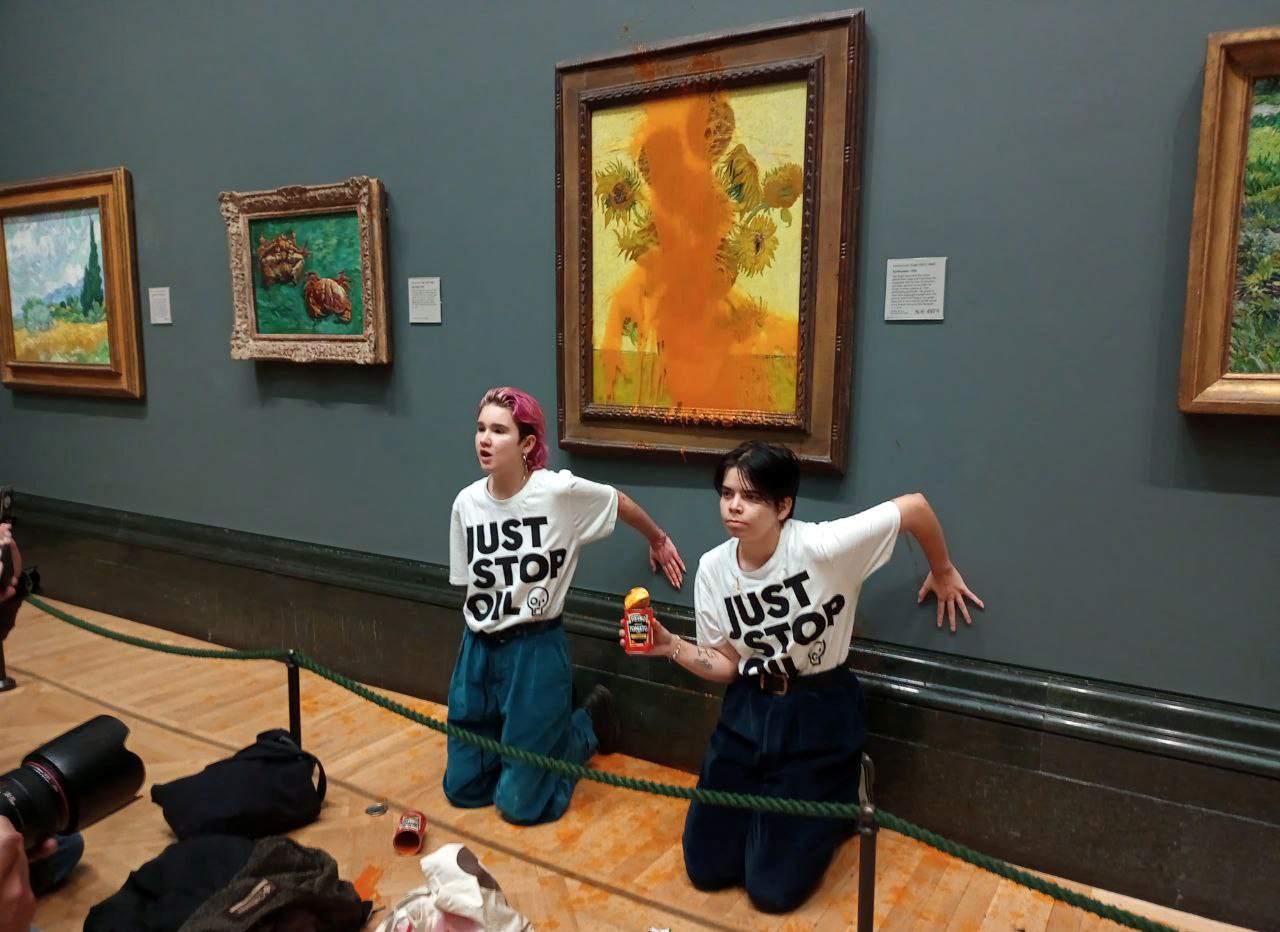The National Gallery Spent Just £150 Retouching Van Gogh Frame After Just Stop Oil ‘Souping’

The National Gallery spent just £150 retouching the frame of Van Gogh’s Sunflowers after two climate activists threw soup on it – a stunt which saw the pair convicted of criminal damage estimated at between £8,000 and £10,000.
In October 2022, Just Stop Oil (JSO) activists Anna Holland and Phoebe Plummer threw tins of Heinz tomato soup at the iconic artwork from 1888, before glueing themselves to the gallery wall, in an action which grabbed headlines worldwide. The painting itself, at the time valued at £86m, was protected by a thick pane of glass. Its 17th-century Italian frame was not.
Shortly after the JSO action, the painting was removed from the gallery, its frame touched up, then put back on display a few hours later. In an email solicited via a Freedom of Information request and seen by Novara Media, the museum’s head of framing Peter Schade estimated the cost of the frame’s retouching at “£150 in staff time and materials”. The gallery also spent around £250 in labour time restoring the wall, as well as £35 on a tin of paint.
When asked by Novara Media whether it has plans to perform a full restoration on the frame, the gallery declined to comment.
Southwark crown court heard that the cost to retouch the frame such that it could be rehung was “not substantial” (the £150 figure came up in the trial, but was not widely reported), and that a more extensive repair would cost much more. However, Judge Christopher Hehir ruled that the value of the damage was irrelevant for the jury. Judge Hehir also barred any mention of the climate crisis in Holland and Plummer’s defence.
Holland and Plummer were found guilty and received a combined three and a half years’ sentence.
Listen to Committed – a four-part podcast about Britain’s jailed climate activists, including Anna Holland and Phoebe Plummer – here.
The minimal amount spent on retouching the frame points to the sometimes cavernous gap between how English law assesses criminal damage and costs in the real world.
When estimating the value of criminal damage, Blackstone’s Criminal Practice – the manual used by criminal lawyers – advises practitioners use “the probable market cost of repairs” (in this case, a full restoration) “or the probable market replacement cost, whichever is the less”. The law does not have to consider the actual amount paid to repair or retouch a damaged item.
When sentencing the pair, Judge Hehir – known for his harsh treatment of climate activists – cited another reason for handing Holland and Plummer such long jail terms (20 months and two years respectively). “It is not the value of the damage caused to the frame that is the most serious aspect of your offending,” Hehir said. “You came within the thickness of a pane of glass of irreparably damaging or even destroying this priceless treasure, and that must be reflected in the sentences I pass.”
The severity of Holland and Plummer’s sentences were controversial at the time. Following the sentencing, human rights lawyer Aabhinav Tyagi wrote a post for JSO’s blog criticising Judge Hehir’s remarks, in which he’d suggested that the pair had come close to damaging the painting. “By prioritising speculative risks over concrete facts,” Tyagi wrote, “the judge imposed a sentence that does not reflect the severity of the actual offence. Sentencing should address the specific harm caused by the defendants’ actions, not punish them for imagined outcomes.”
“This deviation sets a dangerous legal precedent where individuals can be penalised for potential consequences rather than their proven conduct,” he added.
On the day of Holland and Plummer’s sentencing in September last year, three JSO activists targeted Sunflowers again in another soup-throwing action.
The organisation Rebels in Prison estimates that there are currently 17 activists held in English prisons, most of them members of Just Stop Oil and Palestine Action.
Jolyon Maugham is director of The Good Law Project, a progressive organisation that campaigns for changes to the law. Speaking to Novara Media, Maugham said: “English law’s treatment of those protesting the destruction of the planet for profit perfectly accords with Wilhoit’s law that ‘There must be in-groups whom the law protects but does not bind, alongside out-groups whom the law binds but does not protect.’”
Charlie Hindhaugh provided additional reporting.
Clare Hymer is head of articles at Novara Media.
Rivkah Brown is a Novara Media commissioning editor and reporter.


